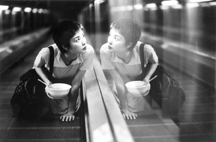All Aboard
'Chungking Express' marries Hong Kong action to art-film quirkiness
By Richard von Busack
Wong Kar-Wai's superslick Chungking Express brings some of the velocity and beauty of the Hong Kong movie to a different audience than the action fans. If lured to Chungking Express by the dashing title, the hardcore stunt freaks will end up in the same position as the boxing fans in The Magic Christian who are outraged by the pugilists kissing in the ring--and sickened by the lack of blood.
Chungking Express arrives mainly on the say-so of Quentin Tarantino, who loves it enough to import it under the aegis of his Rolling Thunder film company. What is there to say about the deliberate quirkiness of a Hong Kong movie about police in which the cops don't fire a single shot? Indeed, the cops don't seem to have much to do except nurse their broken hearts after being dropped hard by their girlfriends.
Cop #223 (Takeshi Kaneshiro), known only by his badge number, mentions in passing that it's been six months since he actually arrested anybody; Cop #663 (Tony Leung) spends his time doing lunch. The breakups have caused them to retreat into weird little rituals: #223 is collecting canned pineapple by the expiration date, and #663 has been talking to his four walls a little too seriously ("You look so thin; you used to be so chubby," he tells a bar of soap).
The movie doesn't take place in Chungking proper but (half of it at least) in Chungking Mansions, a Hong Kong tenement. The movie is divided into two parts, with the seam being the Midnight Express takeout food counter.
In the first part, lovelorn cop #223 goes through philosophical musings. These thoughts ("Do memories have expiration dates?") are interspersed with the efforts of a nameless drug smuggler (Brigitte Lin) to run a pack of Indian mules. When the mules vanish with the drugs, she is in danger of being killed by her unseen bosses. On the run, she ends up encountering #223, who has been walking the streets to get away from his apartment. Drunk, he's promised himself that he'll fall in love with the first woman who sets foot in the bar.
In the second section, #663, dropped by his stewardess girlfriend, is somehow immune to the appeal of the counter-girl (Faye Wang) at the Midnight Express; when she gets a hold of his apartment keys, she starts using 663's apartment as a sort of second home--cleaning up, leaving him presents and inadvertently flooding the place.
Obviously, it's a gravely silly film, made more intelligent by its structure and its artifice--the way, for example, a restaurant named California becomes a sort of middle ground between the golden wonderland suggested (and suggested one too many times) by the Mamas and the Papas' song "California Dreamin' " and the real state, somewhere eight time zones away.
The slightly heartbroken mood is probably traceable to the film's setting in a place where some who can afford it are opting for exile before the Chinese take over--such people have a habit here of dropping out of sight. When the velocity slows, and it does slow in the second section, then the old-fashioned romanticism and the dependence on such Victorian tropes as undelivered letters, unspoken crushes and tricks of fate make the artifice look as deliberate and forced as in a vintage bad Hollywood movie.
When Chungking Express starts to falter, the mulling over the principle that "fate rules the universe" become too obvious--this idea is as mulled-out at this point as "love rules the universe." Even so, Wai's movie has a sleek, original look. Critics commenting on the lack of natural light forget to mention that there aren't too many exteriors in Hong Kong films anyway. The cinematography features night scenes of convenience stores, fluorescent lights and fast-food counters that have a soft dreaminess instead of looking dead and green.
Though its French New Wave and East Village Newer Wave influences stick out like the roots in a bad dye job, Chungking Express is a droll, provocative film, especially recommended for the presence of Wang as the outrageous little crop-haired gamine who stirs things around in #663's apartment. Wang, a Hong Kong pop star, is a magnetic presence, playing with the borders of thorniness and horniness, as enlivening in the general cool forlornness as Roberto Benigni is in Jim Jarmusch's movies.
[ Metro | Metroactive Central | Archives ]

Double Take: Hong Kong pop star Faye Wang adds magnetism to "Chungking Express."
Chungking Express (PG-13; 100 min.), directed and written by Wong Kar-Wai, photographed by Christopher Doyle, and starring Brigitte Lin.
